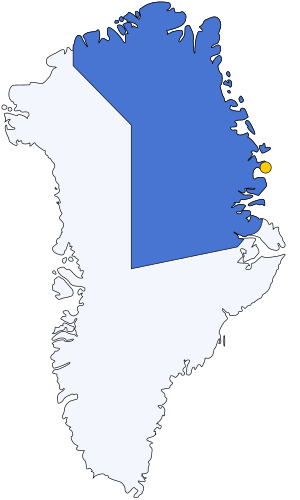Earth:Zackenberg Station
Zackenberg (or ZERO - Zackenberg Ecological Research Operations), or Zackenberg Research Station,[1] is an ecosystem research station and monitoring facility situated in the Northeast Greenland National Park in northeastern Greenland. The station is owned by the Greenland Self-Government and was run by the Danish Arctic Institute (Dansk Polarcenter)[2][3] until 2008. In 2009 the running of the Station was transferred to the Dept of Arctic Environment at the Danish National Environmental Research Institute [4]
Geography
Zackenberg Ecological Research Operations is named after the Zackenberg Mountain and lies in the eastern part of King Christian X Land about 2 km inland on the south coast of Wollaston Foreland peninsula at Young Sound in the Greenland Sea, roughly 450 km (280 mi) northwest of Ittoqqortoormiit. About 5 km (3.1 mi) southwest of the station lies the 911 meters (2,989 feet) high Mount Zackenberg. Daneborg station is about 25 km (16 mi) southeast of Zackenberg. Near the Zackenberg Station is the Zackenberg River, part of a fjord with outflow glaciers.[1] The Freya Glacier is located on Clavering Island 10km southeast of the Zackenberg Research Station.[5]
Climate
Zackenberg Station is situated in a tundra climate (ET), with long, cold winters and short, cool summers. Despite its high humidity, precipitation is relatively low.[6]
Script error: No such module "weather box".
Facilities
Zackenberg has 10 buildings holding scientific equipment and laboratories, living accommodations and a communication room.[7] The station can host up to 20 persons at the same time with additional 10 persons at the branch facility at Daneborg. Zackenberg Station has normally been open for scientists from June to August but since 2007 the season has been extended from approximately May to October. Research takes place within the framework ZERO (Zackenberg Ecological Research Operations) dealing with issues concerning ecosystem science.[2][7]
History
A group of experienced scientists investigated various potential locations for a new research facility in Northeast Greenland in 1991 and concluded that the position near the Zackenberg Elv delta was optimal.[8] The construction of the station was started in 1995 and the station was officially opened in August 1997.[2]
See also
References
- ↑ 1.0 1.1 Citterio (2017). "Towards quantifying the glacial runoff signal in the freshwater input to Tyrolerfjord–Young Sound, NE Greenland". Ambio 46 (Suppl 1): 146–159. doi:10.1007/s13280-016-0876-4. PMID 28116690.
- ↑ 2.0 2.1 2.2 [1], Danish Polar Center
- ↑ [2], East Greenland
- ↑ [3], NERI
- ↑ Hynek (2015). In-situ glacier monitoring in Zackenberg (NE Greenland): Freya Glacier and A.P. Olsen Ice Cap. Bibcode: 2015EGUGA..1715477H.
- ↑ 6.0 6.1 "Present-Day Climate at Zackenberg". Advances in Ecological Research. https://www.researchgate.net/publication/241065805_Present-Day_Climate_at_Zackenberg.
- ↑ 7.0 7.1 [4], Zackenberg Station
- ↑ Andersson, T.I.H.; Böcher, J.; Fredskild, B.; Jakobsen, B.H.; Meltofte, H.; Mogensen, G.S.; Muus, B. (1991). Rapport om muligheden for placering af en naturvidenskabelig forskningsstation ved Zackenberg, Nationalparken i Nord- og Østgrønland. University of Copenhagen and Danish Polar Center. pp. 48.
External links
[ ⚑ ] 74°28′11″N 20°34′25″W / 74.4697431°N 20.5735087°W
 |



